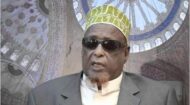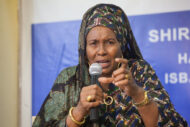A winner of the 2003 Wilbur Award for best book of the year on a religious theme, author and poet and appearing on Ted Koppel’s “Nightline” documenting the Haj, Michael Wolfe describes his motivations for accepting Islam.
After twenty-five years as a writer in America, I wanted something to soften my cynicism. I was searching for new terms by which to see. The way one is raised establishes certain needs in this department. From a pluralist background, I naturally placed great stress on the matters of racism and freedom. Then, in my early twenties, I had gone to live in Africa for three years. During this time, which was formative for me, I rubbed shoulders with blacks of many different tribes, with Arabs, Berbers and even Europeans, who were Muslims. By and large these people did not share the Western obsession with race as a social category. In our encounters, being oddly colored, rarely mattered. I was welcomed first and judged on merit later. By contrast, Europeans and Americans, including many who are free of racist notions, automatically class people racially. Muslims classified people by their faith and their actions. I found this transcendent and refreshing. Malcolm X saw his nation’s salvation in it. “America needs to understand Islam,” he wrote, “because this is the one religion that erases from its society the race problem.”
I was looking for an escape route, too, from the isolating terms of a materialistic culture. I wanted access to a spiritual dimension, but the conventional paths I had known as a boy were closed. My father had been a Jew; my mother Christian. Because of my mongrel background, I had a foot in two religious camps. Both faiths were undoubtedly profound. Yet the one that emphasizes a chosen people I found insupportable; while the other, based in a mystery, repelled me. A century before, my maternal great-great-grandmother’s name had been set in stained glass at the high street Church of Christ in Hamilton, Ohio. By the time I was 20, this meant nothing to me.
These were the terms my early life provided. The more I thought about it now, the more I returned to my experiences in Muslim Africa. After two return trips to Morocco, in 1981 and 1985, I came to feel that Africa, the continent, had little to do with the balanced life I found there. It was not, that is, a continent I was after, nor an institution, either. I was looking for a framework I could live with, a vocabulary of spiritual concepts applicable to the life I was living now. I did not want to “trade in” my culture. I wanted access to new meanings.
After a mid-Atlantic dinner I went to wash up in the bathroom. During my absence a quorum of Hasidim lined up to pray outside the door. By the time I had finished, they were too immersed to notice me. Emerging from the bathroom, I could barely work the handle. Stepping into the aisle was out of the question.
I could only stand with my head thrust into the hallway, staring at the congregation’s backs. Holding palm-size prayer books, they cut an impressive figure, tapping the texts on their breastbones as they divined. Little by little the movements grew erratic, like a mild, bobbing form of rock and roll. I watched from the bathroom door until they were finished, then slipped back down the aisle to my seat.
We landed together later that night in Brussels. Reboarding, I found a discarded Yiddish newspaper on a food tray. When the plane took off for Morocco, they were gone.
I do not mean to imply here that my life during this period conformed to any grand design. In the beginning, around 1981, I was driven by curiosity and an appetite for travel. My favorite place to go, when I had the money, was Morocco. When I could not travel, there were books. This fascination brought me into contact with a handful of writers driven to the exotic, authors capable of sentences like this, by Freya Stark: “The perpetual charm of Arabia is that the traveler finds his level there simply as a human being; the people’s directness, deadly to the sentimental or the pedantic, like the less complicated virtues; and the pleasantness of being liked for oneself might, I think, be added to the five reasons for travel given me by Sayyid Abdullah, the watchmaker; “to leave one’s troubles behind one; to earn a living; to acquire learning; to practice good manners; and to meet honorable men.”
To be continued next week

 All Posts
All Posts









